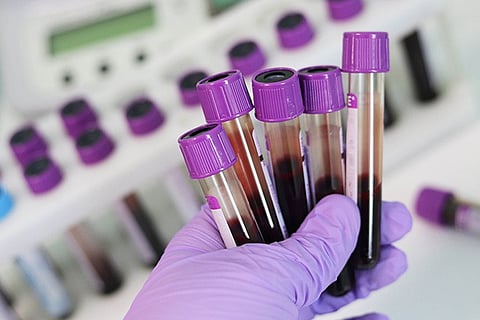

On Sunday, the Union Health Ministry issued an official statement stating that a new test developed by the Indian Council of Medical Research (ICMR)-National Institute of Virology (NIV) Pune, would be used for ‘antibody detection of COVID-19.’ The new test being introduced is called the ‘COVID KAVACH ELISA’ is a type of biochemical test known as enzyme-linked immunosorbent assay or ELISA.
Scientists at NIV Pune were able to isolate the SARS-CoV-2 virus from the samples of those who had been diagnosed with COVID-19, which then led them to develop this particular screening test which can be used to detect antibodies formed against the novel coronavirus in an individual’s blood.
The ELISA technique has been commonly used to confirm the presence of the HIV virus in an individual which causes AIDS (acquired immunodeficiency syndrome). It can also be used to detect syphilis and even infection with the Zika virus.
ELISA Microplate (Youtube screenshot/Arbor Assays)
An ELISA microplate has several tiny wells as pictured, which are all coated with an antigen to a specific antibody, in this case, this is the IgG antigen that forms naturally in response to infection with SARS-CoV-2. Different dilutions of the person’s blood sample are taken and deposited in each well. If the antibody to the IgG antigen for COVID-19 is present, the solution in the well will change colour, which indicates that that sample is positive for the antibody to COVID-19.
However, since the test can only detect antibodies, it only can tell whether an individual has been previously infected by the novel coronavirus and will not be useful in determining whether someone is currently infected. Active infections can be diagnosed using real-time polymerase chain reaction (RT-PCR) method which detects for the presence of viral genetic material. However, the advantage of using ELISA is that even asymptomatic individuals will screen positive using this method, even if there is a lower viral load (lesser presence of the virus in the blood), due to the nature of sensitivity of the test.
According to an official statement from the Union Health Ministry, the ELISA test has already been tried in two sites in Mumbai, and had “high sensitivity and specificity,” meaning that the test results were accurately positive in most cases. An advantage of this method is that 90 samples can be tested at once and each cycle of tests takes about 2.5 hours to complete.
National Institute of Virology, Pune has successfully developed the 1st indigenous anti-SARS-CoV-2 human IgG ELISA test kit for antibody detection of #COVID19 .
— Dr Harsh Vardhan (@drharshvardhan) May 10, 2020
This robust test will play a critical role in surveillance of proportion of population exposed to #SARSCoV2 infection pic.twitter.com/pEJdM6MOX6
“Moreover, ELISA based testing is easily possible even at the district level as the ELISA kit has an inactivated virus. There are also minimal biosafety and biosecurity requirements as compared to the real-time RT-PCR test. The test has an advantage of having much higher sensitivity and specificity as compared to the several rapid test kits which have recently flooded the Indian market,” reads the statement issued by the Ministry of Health and Family Welfare (MoHFW).
The Union Health Minister also stated in a Tweet that NIV has passed on the technology for producing the tests to Zydus Cadila, a pharmaceutical company based in Ahmedabad, Gujarat for ‘mass-scale production.’ Commercial production and marketing will be done by the company which has received permission from the Drug Controller General of India (DCGI) for the same.
These tests are different from the earlier used rapid antibody testing kits which had been procured from China. The tests were eventually returned to the manufacturers after several of the results were found to be faulty. The Indian government subsequently banned testing kits from Chinese manufacturers Guangzhou Wondfo Biotech and Zhuhai Livzon Diagnostics.
While there has not been any official statement regarding the exact manner in which ELISA will be implemented, officials have stated that the tests will be done as part of the surveillance of COVID-19.